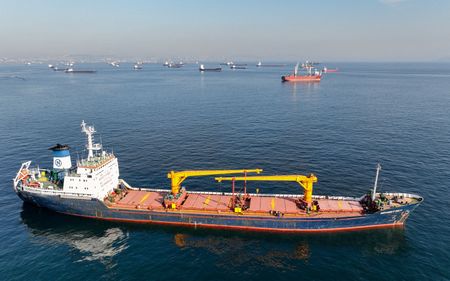 1
1 1
1
(Reuters) – Russia refused on Monday to extend the agreement that has enabled Ukraine to export grain from its Black Sea ports for the past year, complaining that promises to free up its own shipments of food and fertilisers had not been kept.
Russia’s Foreign Ministry said it had notified Ukraine, Turkey and the United Nations that “without Russia’s participation, the ‘Black Sea Initiative’ ceases to function from July 18”.
This meant the withdrawal of safety guarantees for shipping, the ending of a maritime humanitarian corridor and the disbanding of the Joint Coordination Centre at the mouth of the Black Sea in Istanbul established to monitor the implementation of the deal, it said.
It meant the northwestern Black Sea would again be designated an area of temporary danger for shipping, the ministry said.
The deal, brokered by the U.N. and Turkey last July, aimed to alleviate a global food crisis by allowing Ukrainian grain blocked by the Russia-Ukraine war to be exported safely.
To convince Russia to agree to it, a three-year memorandum of understanding was also struck with the United Nations under which U.N. officials agreed to help Russia with its food and fertiliser exports.
But the ministry statement said none of Russia’s requirements – including the resumption of ammonia exports through a pipeline leading from Russia to the Ukrainian port of Odesa, and the reconnection of its state agricultural bank Rosselkhozbank to the SWIFT international payments system – had been met.
“Under these conditions of outright sabotage in the implementation of the Istanbul agreements, the continuation of the ‘Black Sea initiative’, which did not justify its humanitarian purpose, becomes meaningless,” it said.
The deal had been extended several times, but was due to expire on Monday. Russia had been saying for months that conditions for its extension had not been fulfilled, and Kremlin spokesman Dmitry Peskov was the first to confirm that Russia was not renewing it.
But he signalled Russia was not necessarily quitting the deal for ever.
“As soon as the Russian part of the agreements is fulfilled, the Russian side will return to the implementation of this deal immediately,” Peskov said.
The foreign ministry said: “Only upon receipt of concrete results, and not promises and assurances, will Russia be ready to consider restoring the deal.”
Peskov said the decision not to renew was unrelated to an overnight attack on the bridge between Russia and Crimea in which two people were killed.
“These are absolutely unrelated events. Even before the terrorist attack, the position was declared by President Putin,” Peskov said.
(Reporting by Reuters; Writing by Mark Trevelyan; Editing by Kevin Liffey)